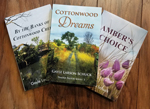Spring Garden Glory
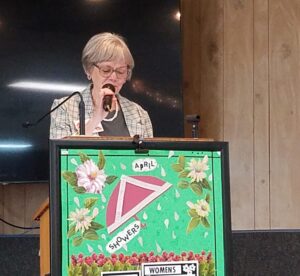 Last week I had the privilege of speaking at the Women’s Connection brunch here in Bismarck. I was filling in for another speaker. With one day to prepare, I used material from my book of essays, Grace Like Snow and a couple unpublished stories. The title of my presentation was “Nurturing the Garden of Your Soul.” I talked about finding peace, hope and grace in a garden setting.
Last week I had the privilege of speaking at the Women’s Connection brunch here in Bismarck. I was filling in for another speaker. With one day to prepare, I used material from my book of essays, Grace Like Snow and a couple unpublished stories. The title of my presentation was “Nurturing the Garden of Your Soul.” I talked about finding peace, hope and grace in a garden setting.
This Saturday I’ll do a similar talk at the Bismarck Garden Expo. The other speakers are horticulturalists and master gardeners. They grow vast gardens and know the Latin names of thousands of plants. Me? Not so much. We have one tiny garden, five rose bushes—assuming they all come up, and a dozen flowerpots.
Still, I offered to do a seminar on Garden Glory and they accepted. On Saturday I’ll click through my PowerPoint presentation and attempt to inspire the audience with family gardening stories.
The Women’s Connection and the Bismarck Garden Expo are happy occasions, compared to one we attended in our hometown on Easter Saturday. That day a “Celebration of Life” was held for my first cousin, Judy. The day was bittersweet. We did celebrate the life of this wonderful woman, even though our hearts were breaking.
Judy will forever be linked to my book Secrets of the Dark Closet, because she owned the house that held the Dark Closet. She also hosted a two-day book signing party for me when the book was published, for which I am indebted.
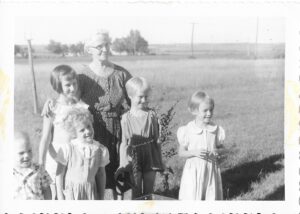 I’m writing about these three unconnected events, because one person ties them together for me. That’s my grandmother, Bessie. At Women’s Connection, I told of growing up with Judy and my other cousins. We loved to run around Grandma’s big yard and pick leaves from her mint plants. Mint has become a symbol of hope to me.
I’m writing about these three unconnected events, because one person ties them together for me. That’s my grandmother, Bessie. At Women’s Connection, I told of growing up with Judy and my other cousins. We loved to run around Grandma’s big yard and pick leaves from her mint plants. Mint has become a symbol of hope to me.
At the Garden Expo, I will tell about the mint, but also about the rich heritage of gardening that was passed down through Grandma Bessie and her mother.
Today would have been Bessie’s birthday. She was born on April 17, 1888. Although she died when I was seventeen, decades later I think about her every day.
Bessie’s influence was not in what she said, but who she was. I write about her many gardens. I write about her cheerful attitude and grandmotherly ways. It was because of these things that I ended up writing a book about the secrets from her childhood and how she overcame so much.
In our fast-paced era it’s hard to see the influence we might have on future generations, but Grandma Bessie’s example endures.
I’ll close by sharing the last paragraph of my Garden Expo talk, which I hope gives food for thought:
“Methinks that peace might reign in the world if we all tended gardens. To delight in overnight garden miracles, to bless one another with flowers and vegetables, to trade gardening tips for the new growing season. These things are real and close to the earth. They ground us in the goodness and glory of God.”
So Happy Birthday, Bessie! And Happy Spring to all of my readers! Please make time to discover the garden glory of new plants raising their heads to the spring sunshine.
Late Summer Garden Glory
“The glory of gardening: hands in the dirt, head in the sun, heart with nature. To nurture a garden is to feed not just the body, but the soul.” – Alfred Austin.
In early September, I went outside to work in the garden. A clouded, dewy morning greeted me. It was already 70 degrees out. No wind. Too early for neighborhood mowers to cut the silence or Hemi’s to rumble into the peace. I was alone in the silent light of the season’s colorful, full-scented offerings.
Our garden was a tish past prime. The leaves on the green bean and towering tomato plants were turning brown. Still, dozens of new cherry tomatoes appeared each day. We’d already made salsa, spaghetti sauce, and dried cherry tomatoes the day we picked another 18 pounds of tomatoes.
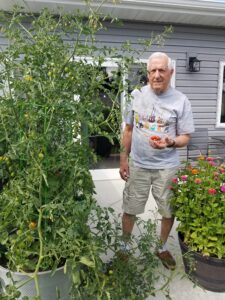 This morning, I took out a strainer and filled it with green beans. What a wonder! From a small handful of seeds, the plants quickly outgrew the poles and fences we put up for them to climb. The beans came early and bountiful, and then they quit producing. The tops of the plants held hundreds of blossoms for a week, two weeks, three weeks. Would they ever deliver more beans? Then one morning, four-inch, five-inch, six-inch beans hung ready to be discovered and picked.
This morning, I took out a strainer and filled it with green beans. What a wonder! From a small handful of seeds, the plants quickly outgrew the poles and fences we put up for them to climb. The beans came early and bountiful, and then they quit producing. The tops of the plants held hundreds of blossoms for a week, two weeks, three weeks. Would they ever deliver more beans? Then one morning, four-inch, five-inch, six-inch beans hung ready to be discovered and picked.
The glory of gardening is stepping into the house with green bean blossoms sprinkled in your hair and on your shirt, and a strainer full of beans in your hand. Unless you’ve reach into the viney depths of a bean patch, you might not know their leaves stick like Velcro to your clothes, or that a passel of beans can remain cleverly hidden right before your searching eyes.
For weeks, we watched swallowtail butterflies and honeybees frequent the zinnias which were in a tub right outside the back door. Sometimes finches flitted in and snitched petals from the flowers. What great entertainment for the price of a packet of seeds and a watering hose.
“Gardening is cheaper than therapy and you get tomatoes.” – Anonymous
One day I went to check on the flowerpots lined up in front of the house. I was wearing a cotton t-shirt with a row of flowers across the front. Suddenly something flew at me, zipped around me and went back to the flowers. A hummingbird! But, since when do hummingbirds attack people? Upon closer inspection, the tiny winged creature was a moth that looked like a hummingbird. And apparently, it thought my shirt looked like a flower.
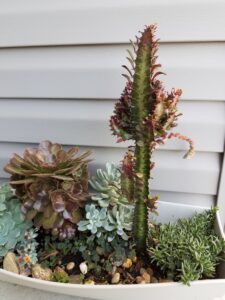 While writing this, two women from a different religion came to the front door to talk about faith and politics. However, they got sidetracked from their mission. We spent ten minutes talking about the African Milk Plant that lives in the shelter of our front porch. They departed after a lively discussion about gardening, their original purpose forgotten. Later my husband said that before they rang the doorbell, they snapped a photo of the room-size rose bush in our front yard.
While writing this, two women from a different religion came to the front door to talk about faith and politics. However, they got sidetracked from their mission. We spent ten minutes talking about the African Milk Plant that lives in the shelter of our front porch. They departed after a lively discussion about gardening, their original purpose forgotten. Later my husband said that before they rang the doorbell, they snapped a photo of the room-size rose bush in our front yard.
Methinks that peace might reign in the world if we all tended gardens. To delight in overnight garden miracles, to bless one another with flowers and vegetables, to trade gardening tips for the next growing season. These things are real and close to the earth. They ground us in the goodness and glory of God.
“Flowers always make people better, happier, and more helpful;
they are sunshine, food and medicine for the soul.” –Luther Burbank.
When Life Gives Us Thorns

Truths and roses have thorns about them. Henry David Thoreau
One of my first outdoor jobs each spring is to clean out the protective coat of oak and ash leaves piled on the rose bushes in our yard. The plants seem to like shedding their winter coats and I enjoy looking for new green shoots and branches. Plus, the rose bushes are a special blessing as they provide beautiful flowers all summer.
Roses also offer great life lessons as I learned one day. I had reached between two branches to pull out some leaves when a thorn pierced the top of my hand.
My hands are not my own these days. They’re my Grandma Bessie’s hands, full of spots and wrinkles and clearly marked with veins. The thorn stabbed me between two blood vessels. Pricking either one would have produced a fountain of blood instead of a sharp sting.
Thorns are first mentioned in the Bible in Genesis 3. They were part of the curse Adam lived under for disobeying God, and they are still a curse. Ask any gardener, farmer or rancher.
And the poor roses must feel the pain of carrying all those uncomfortable thorns. When the wind blows and the leaves rustle, they certainly are pierced by their own thorns. I wonder how you say “ouch” in rose language?
Even though we don’t like thorns, they are necessary. According to http://plantopiahub.com, they offer plants a defense against predators similar to the claws and teeth of animals. They give plants structural support. Also, they’re protection from extreme weather, such as hailstones that might get caught on thorns rather than hitting tender shoots.
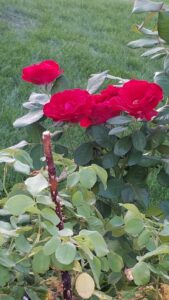 We human often have thorns in our lives, too, and we don’t like them very much. They slow us down and sidetrack us from our plans. Or so we think. But what if the thorns in our lives were meant to defend, support and protect us?
We human often have thorns in our lives, too, and we don’t like them very much. They slow us down and sidetrack us from our plans. Or so we think. But what if the thorns in our lives were meant to defend, support and protect us?
In his book Desiring God, John Piper discusses the thorn in his life. “It makes almost everything harder, daily dogging me as I carry out my family, vocation, and ministry responsibilities — nearly everything I do. It weakens me. I often feel that I would be more effective and fruitful without it.”
Thorns and thorny situations take the pride out of us and force us to do what we should be doing anyway: relying on God. When we accept our thorns and trust him, he will defend, support and protect us.
Saint Paul asked God three times to remove the thorn in his flesh. Finally, Paul relayed, “But he said to me, ‘My grace is sufficient for you, for my power is made perfect in weakness.’” That story is found in II Corinthians 12.
Do you have a thorn in your life? Ask God to remove it! But if he doesn’t, then perhaps it’s time to work with it rather than against it. That’s what roses do. In accepting their thorns, their true beauty is shown.
Writing Update
What a fun time we had at Turtle Days in Turtle Lake, North Dakota. Book sales were brisk, we met a lot of great people, and we got to watch the national and international (!) turtle races. If you’ve never gone to a small-town event, I highly recommend finding one to attend. It will remind you of what America is about.
God Bless the “United” States!
God Bless the United States!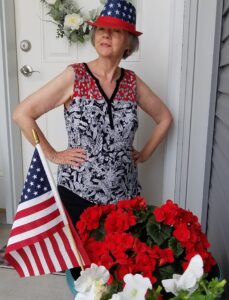
As the Fourth of July approaches, red, white and blue décor is appearing everywhere. Celebrating the Fourth is always a highlight of summer.
However, the parades, parties and picnics that we plan are a big contrast to the dark news that fills the airwaves. Civil unrest, mass shootings, nuclear threats. If you listen long enough you’re sure to think the end of us is near.
What has happened to our beloved country? We no longer seem to be the United States of America. Have we forgotten that “united we stand, divided we fall.”
Recently N.D. Governor Doug Burgum said, “The nation’s enemies love it when we’re fighting with each other.” I love that quote because I often think of us as a group of children fighting among ourselves, forgetting our blessings or the danger that lurks outside the door.
Perhaps we need to go back to the vision our Founding Fathers had for our country. Before the government of the United States was formed in 1776, the founders met for prayer, and they found direction in the scriptures. When they began writing the new Constitution, they based it on the Biblical principles.
Our first president, George Washington, said, “It is the duty of all nations to acknowledge the Providence of Almighty God, to obey His will, to be grateful for His benefits, and to humbly implore His protection and favor.”
So, maybe we need to look at how our nation was formed. The Founders sought God’s wisdom. Perhaps we should, too. And even though they had many conflicting viewpoints, they agreed it was for the good of everyone to work together to launch the new nation. Perhaps it’s time to lay down our own word weapons and really see what we have in common. And what we have to lose if we continue to fight each other.
As we celebrate Independence Day, let us take time to acknowledge our God, seek his will for our nation, and ask for his protection and favor. God bless America!
“Kindness is the golden chain by which society is bound together.”
~ Johann Wolfgang von Goethe
Writing Update
I’ll be signing books in Turtle Lake, N.D. on July 14 for Turtle Days! Three of my books take place in the general area of Turtle Lake, and I’m excited to be part of the festivities there. My table will be in the American Legion building from 10 a.m. to 3 p.m. If you have friends or family in the area, please let them know.
Writing: I’ve been slaving over a family history project. The working title is Little Sister. I’m the last person in my generation of the Larson family and feel I need to record the family stories.
As I wrote in the Introduction: “It wasn’t until I was thirty-four years old, that I realized I would always be a generation behind my siblings. There was no catching up. They were now in their fifties, becoming grandparents and dealing with health issues. I was still taking college classes. If it was my lot in life to be set apart from my siblings, then it was my privilege to be their Little Sister. They were more than my sisters and brothers, they were my friends and heroes.”
In writing, I’m learning much about my family and about myself.
Have a great July Fourth and a wonderful summer!
Sewing Serenity
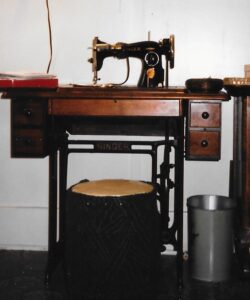 Consider this story a late Mother’s Day post. The inspiration came to me this morning as I considered the next chapter of my memoir, Little Sister. In the end, I decided it didn’t fit well with the chapter I was writing, but it might make a good blog post.
Consider this story a late Mother’s Day post. The inspiration came to me this morning as I considered the next chapter of my memoir, Little Sister. In the end, I decided it didn’t fit well with the chapter I was writing, but it might make a good blog post.
In her early years of motherhood, Mom struggled to raise six kids in the heart of the Depression and Dustbowl. She said that one year my father asked her to clothe all the children for the winter with just twenty dollars.
She became an expert at patching and remaking clothing. The girls wore dresses made from flour sacks. She even made coveralls for the boys, judging by one of the photos from that era.
Her bad-tempered old sewing machine was a constant source of frustration through those years. Then in 1940, Mom did something unheard of—she purchased a sewing machine on credit.
She ordered the Singer treadle sewing machine from Fargo on April 13 for $110. For the next several years, she made $3-5 payments each month with money she earned from selling cream and eggs. The machine had a dressmaker head to handle heavy fabrics, such as denim and wool.
She used that machine for over forty years to make clothing for herself, and her children and grandchildren. She patched jeans, designed winter coats, and sewed formals for her daughters. One of her granddaughters now has the machine. The three original bobbins and the receipts are still in it.
In later years when there was less need to make garments, Mom pieced quilts and sewed them together on her Singer. Then she set up a quilting frame in her living room and quilted them by hand. She seldom bought new fabric for quilts. Instead, they were made of remnants she stored in a clothes hamper.
After I came along and we moved to town, she began working fulltime. She always had a job where she stood on her feet all day. Yet, at night after the household chores were finished, she’d take out her latest sewing project and work on it.
Mom loved to sew the way I love to write. It was her passion.
Perhaps the steady thrum of the thread being pulled along its route, the whirl of the wheel dipping up and down, and the sigh of the treadle moving back and forth brought peace to her insecure life.
When she moved into Grandma Muir’s house, she clipped a copy of the Serenity Prayer from a magazine and framed it. For the rest of her life, it hung over her sewing machine.
The prayer reminds me of an old hymn that Mom surely sang in church for most of her life. What a Friend We Have in Jesus was written by Joseph Scriven, who endured much heartache and hardship in his life. One of the lines says, “What a privilege to carry everything to God in prayer!” There is no greater peace than to trust God for the outcome of things we can’t control.
May you find that serenity today!
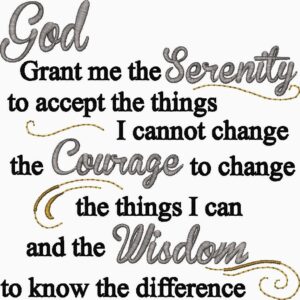
Writing Update
Many thanks for ordering my books and sharing them with others. It’s so much fun to hear from readers! That’s especially true because I haven’t been able to do book signings or events yet this year.
Friendship is sewn by love and measured by kindness.- Anonymous
Potatoes on Good Friday
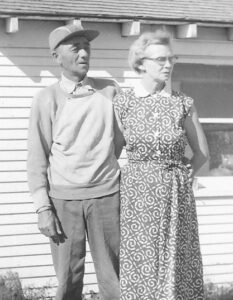 Dad always planted potatoes on Good Friday. It was a tradition passed down in his family. A tradition he kept no matter what, even though his family was Christian, but he didn’t go to church. Even though, he lived by the Golden Rule and Ten Commandments, but sometimes forgot to come home from the bar.
Dad always planted potatoes on Good Friday. It was a tradition passed down in his family. A tradition he kept no matter what, even though his family was Christian, but he didn’t go to church. Even though, he lived by the Golden Rule and Ten Commandments, but sometimes forgot to come home from the bar.
One cloudy, cold Good Friday Dad came into the house and announced it was time to plant the potatoes. Mom frowned as she looked out the kitchen window, which was splatted with cold raindrops.
We’d set out teacups, along with a little box of red, blue, green and yellow dye to color Easter eggs. She had punched the bread dough down and formed a pan full of buns that rose on the counter with yeasty fragrance.
Usually, Dad drifted along with life, but he was firm about planting potatoes on Good Friday, so Mom took off her apron.
We eased down the wooden steps into the dirt cellar under the kitchen. The potatoes were kept in a bin in the corner. There were just enough spuds to feed us until the summer crop came in. Dad and Mom filled their bucket with the ones that had sprouted “eyes.”
Back in the kitchen, Dad stepped to the window and peered out, maybe seeing how cold and wet it was for the first time. Then he went to Plan B, deciding to only plant a couple hills of spuds. They’d seed the rest of the crop when the ground fully thawed.
We drove to a field south of the farm buildings and got out. The damp chilly air passed through our woolen coats like a ghost through a wall. My teeth chattered with cold.
I watched as Dad scooped out a couple holes in the hard, dank earth. Mom sliced some potatoes with a knife, making sure there was an eye in every piece.
I didn’t dare ask the questions that burned in my heart. What if the sprouts didn’t grow? It seemed dumb to bury perfectly good food. And why, for Pete’s sake, did we have to plant potatoes on Good Friday no matter what the weather?
My job was to bend over the holes and push in the potatoes, eyes up. Then, Dad solemnly shoveled dirt over each hill.
Dad’s been gone now for over fifty years, and I’m only beginning to understand why he found it urgent to bury potato seed on Good Friday.
For us, potatoes were the staff of life, like bread or rice are in other cultures. To bury them was an act of trust that new life would burst from them, multiplying the seed.
Certainly, Dad’s desire to plant potatoes on Good Friday was a veiled clue to his beliefs. It was his way of showing that he believed in the hope found in Jesus Christ.
“Jesus replied, “I must fall and die like a kernel of wheat that falls into the furrows of the earth. Unless I die I will be alone—a single seed. But my death will produce many new wheat kernels—a plentiful harvest of new lives.’ John 12:24 The Living Bible
Reading the TV
I first noticed my hearing problem when I was a rookie reporter way back when. While attending city commission meetings, I often asked my fellow reporters what had been said.

Eventually I went to an audiologist and learned I have a fifty percent hearing loss. I can hear high and low sounds, but not so well in the middle. It’s likely I was born with a congenital hearing problem.
Since then, I’ve struggled through board meetings and situations with poor acoustics or sound systems. Also, my family members have very soft voices, so I find myself reading their lips, and watching gestures and facial expressions.
In addition, more than once while driving I’ve failed to hear a nearby ambulance or fire truck. Neither can I hear sirens warning of bad weather.
This all came to a head one day while hiking with my grandsons. One of them made a comment. When I didn’t respond, the other one leaned in and said to him, “She can’t hear you.”
Oh, that I heard. It was time to visit the audiologist again.
Hearing aids help, but I still struggle with my soft-spoken family and hearing in public places. Noisy restaurants are a hearing disaster. In some, the background music is ridiculously loud. It’s stressful enough to hear over the clatter of dishes and voices without music drowning out what little conversation can be had. We look for restaurants that offer quiet ambiance.
We use closed captioning when watching television. That is partly because many shows have background noise that drowns out dialog. Plus, many actors speak clearly until they get to the punch line, and then drop their voices. Without closed captioning, I only understand about one in ten words. It must bother others, too, because a recent article in the AARP magazine stated that a lot of younger people “read the TV.”
There are varying statistics on the number of people in the U.S. with hearing losses. However, the older we get, the more likely we are to have a problem. Here are some tips for communicating with people who have trouble hearing:
- Be aware that it is exhausting for the hearing impaired to discern mumbled words.
- Face people when speaking. It’s surprising how many people turn aside as they speak or try to carry on a conversation from another room.
- Don’t cover your mouth with your hands when you speak.
- Don’t prop your head up with your hand, for this subtly changes your delivery.
- Wait to have serious conversations in a quiet place.
- If something isn’t understood, try rephrasing it.
- Project your voice, or as I tell my family, “Use your outdoor voice.”
- Don’t shout, just shape your words clearly and change the pitch of your voice.
There is no shame in having a hearing loss. Many people can chalk it up to the result of working in a high-decibel environment or listening to loud music. Here are some tips for people who are hard of hearing:
- Get your hearing tested already. Maybe you have earwax. Or maybe it’s time to invest in hearing aids.
- Let people know you can’t hear. I belong to a large book club that meets at the local library. The acoustics in the room aren’t that great. When I finally confessed my problem, the library began microphones.
- Yes, silence can be golden. It is in those quiet moments that we organize our thoughts and dreams. However, we need to hear one another to have a quality life, so don’t delay in getting help.
“Listen to advice and accept instruction, and in the end you will be wise.” Proverbs 19:20
Writing Update: Oh, I have so many writing projects that need help to settle down and work on just one! Meanwhile, I’m taking a thought-provoking online class on Memoir Writing.
Each week I’m blessed with more good comments on Grace Like Snow. When you open your heart and your history, and put it on paper for the world to see, it’s gratifying to know others enjoy and relate to your work. Thank you for every comment. They are treasured.
Happy Valentine’s Day!
Defining Moments
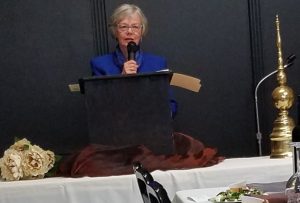 Have you wondered what you would say if you were invited to speak in your hometown? That’s what happened to me last fall when the LaMoure Chamber of Commerce asked me to speak at its annual awards banquet.
Have you wondered what you would say if you were invited to speak in your hometown? That’s what happened to me last fall when the LaMoure Chamber of Commerce asked me to speak at its annual awards banquet.
During the weeks before the banquet, I marveled at the invitation. My husband and I had moved away so very long ago. I was eager to go, but pondered over what to say. It seemed to me that the audience deserved a dose of hope and humor, and some meat for the soul.
This past year, the understanding of “Defining Moments” has caused me to look at the world in a new way. And so that became my topic.
You may not be familiar with the term “Defining Moments” but you’ve certainly had a few crises or turning points in your life. They can be something that happens to you, or something you make happen.
Sidney Evans wrote in a Forbes online article, “A defining moment is a point in your life when you’re urged to make a pivotal decision, or when you experience something that fundamentally changes you.”
Defining moments force us to change, recalibrate our thinking and build resilience.
I’ve had a number of defining moments, and that evening I decided to share one that happened at LaMoure when I was nine. When my parents and I moved from the farm to town, I was sick about it. I’d miss my country friends, prairie views, and the wonder of the big night sky. And, I worried about who would take care of my beloved barn cats.
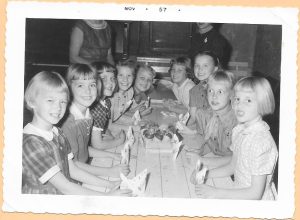 Yet, after we moved, I embraced being a town girl. I no longer had ride the school bus for two hours a day. Instead of being alone on the farm with my cats, there were lots of kids to play with. I was also able to join after-school activities. (And my brother cared for the cats.)
Yet, after we moved, I embraced being a town girl. I no longer had ride the school bus for two hours a day. Instead of being alone on the farm with my cats, there were lots of kids to play with. I was also able to join after-school activities. (And my brother cared for the cats.)
The change that I dreaded was not the end, it was a new beginning.
Often we let fear overcome us in stressful times instead of viewing them as opportunities. Or, as Industrialist Henry J. Kaiser said, “Trouble is only opportunity in work clothes.”
Also, often crisis forces us to settle what we believe about spiritual matters. Is there a God? Is there a heaven? What happens when we die? Why do people suffer?
I asked these questions as a young woman as my father neared death. He had heart disease, cancer and a broken hip. Watching him suffer was almost more than I could bear, and it motivated me to seek God. In time, I embraced Jesus Christ as my Lord and Savior.
Knowing there is a God in heaven, and He knows my name, has helped me recalibrate my thinking and better navigate life. It’s so simple and yet so hard to just trust God to direct our lives. However, that is the best way to become an overcomer with hope and resilience.
It’s so important to notice when others go through troubling moments and offer encouragement. Sometimes people just need to know someone sees and cares when they take on a new challenge or wade through a difficulty.
Because nothing is more draining than indecision, it’s important that we embrace the problem and deal with it. Creating an action plan and moving forward will help bring joy back into our lives.
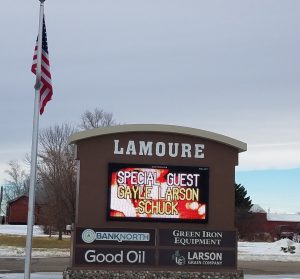
A welcoming sign
We drove into LaMoure the day of the banquet and were delighted by an electronic sign announcing the event. For a few seconds each minute, it read, “Guest Speaker Gayle Larson Schuck.”
The Chamber of Commerce awards banquet was held at the local mall in a lovely room with beautifully decorated tables. The food was five-star. Each of the award nominees was more than deserving of recognition.
And how did my talk go? Hmm, you’d have to ask the audience. However, I came away satisfied because they laughed at the right times, a few tears were shed, and I knew the message was meat for the soul.
So, what are some of your defining moments? Whether they were funny or tragic, they are worth remembering. Tell them to your children, grandchildren or anyone who will listen. By telling your story, you may give someone the hope and inspiration to go on.
And take it one step further. A runner thinks everyone should be out jogging. And a quilter thinks everyone should be in love with fabric stores. A mechanic can’t understand if you don’t enjoy looking under the hood of a car. Well, I’m a writer, and I think everyone should write down their defining moments.
Have a blessed and happy New Year!
Wonders!
“Oh, the weather outside is frightful!” That’s the beginning of popular Christmas song that goes on to say, “Let it snow, let it snow, let it snow!” As I write this, we have eight times more snow on the ground than we usually do at the start of winter. And a third blizzard is happening right now.
 Our usual holiday plans have fallen like, well, like snowflakes. We keep revising what we can still do when the streets have become tunnels and the store shelves are empty of food. The few times we’ve gathered with friends, we trade stories about how deep the snow is. (We almost couldn’t see out our windows!)
Our usual holiday plans have fallen like, well, like snowflakes. We keep revising what we can still do when the streets have become tunnels and the store shelves are empty of food. The few times we’ve gathered with friends, we trade stories about how deep the snow is. (We almost couldn’t see out our windows!)
No one in our area is saying, “Let it snow!”
Except, perhaps, the neighborhood kids. Last week as we hunkered down with a blizzard whipping snow around, I looked out the window and spied some neighbor kids. They were out playing in the snow.
Some gleefully ran up a mountain of snow in their yard, and then slid back down. Others kicked up the fluffy stuff and threw it at each other. You could tell by their energetic movements that they weren’t worried about getting too cold or about how to get the car out of the driveway.
Ah, the wonder of childhood. G. K. Chesterton said, “What was wonderful about childhood is that anything in it was a wonder. It was not merely a world full of miracles; it was a miraculous world.”
What exactly is a wonder? Perhaps it’s something that makes you say, “I wonder how this can be?”
At the beginning of 2022, I picked the word “Wonder” for my word of the year. Now, with the closing of the year, I offer this parting reflection: When did we began letting the cares of adulthood dampen the wonders of childhood? And, how do we gain back some of that wonder at the miracles taking place all around us?
 The Christmas season is full of wonders, if we stop shoveling through our to-do lists and reflect on the original story. Fortunately, a doctor named Luke set aside time to record the birth of Jesus, and it’s found in the Bible. Please take time to read the first and second chapters of the gospel (good news) of Luke.
The Christmas season is full of wonders, if we stop shoveling through our to-do lists and reflect on the original story. Fortunately, a doctor named Luke set aside time to record the birth of Jesus, and it’s found in the Bible. Please take time to read the first and second chapters of the gospel (good news) of Luke.
As Luke unfolded the story of the birth of Christ, the angel informed Mary and her fiancé, Joseph, that they would be the parents of the Son of God. If that wasn’t enough, the government ordered them to go to Bethlehem. Then they couldn’t find a place to stay. That’s why Baby Jesus was born is a stable.
After the birth, some shepherds were working the nightshift when the sky lit up and the angel appeared and told them the good news. Mary, Joseph and the shepherds were all terrified at these strange events. However, when they recovered they trusted that God was at work, and began glorifying and praising Him.
Clearly, their lives were out of their control.
The Christmas story is filled with wonders, and it offers great examples of how to handle the unexpected events of life. Joseph could have rejected Mary. She could have complained about the poor lodging in Bethlehem. The shepherds could have dismissed the heavenly visit as a strange dream. Yet they all put their trust in God.
There is nothing flowery about Luke’s writing. He was clear, direct and detailed in his story. Without added drama, he captured the wonder of the most significant event in history, summing up the story in Luke 2:19 with this: “Mary treasured up all these things and pondered them in her heart.”
We need to also ponder the story of Christmas. As we go through this holiday season and venture into the New Year, let’s take time to be kids again and look beyond the snowbanks of life to find the wonder of each day. To find God in each day.
What wonders have happened in your life this year? Have you shared them with anyone? Have you written them down? Recalling special moments uplifts us when life is less than wonderful. They can also encourage others who go through rough spots. They give us hope!
From our house to yours, Larry and I wish you
a blessed and wonder-filled Christmas and New Year.
Writing Update
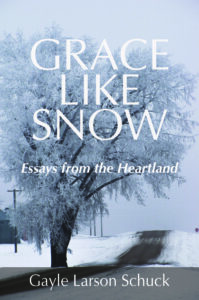 Grace Like Snow, Essays from the Heartland came out in September. The feedback I’m receiving is heartwarming! Thank you so much to all who have purchased the book and to those who have written online reviews.
Grace Like Snow, Essays from the Heartland came out in September. The feedback I’m receiving is heartwarming! Thank you so much to all who have purchased the book and to those who have written online reviews.
Here are just a few:
“Just finished your book. I really have never enjoyed a book more. I couldn’t sleep last nite, read until a few min before 3.” – Johanna
Grace-filled snippets. My husband and I thoroughly enjoyed reading this little book–it’s a collection of thoughts with just enough spirituality thrown in. . .something rare in these times, it’s a book that just makes you feel good. – Jan
Got my 4 in the mail! Just waiting for your autograph! – Kathy
I am so excited about Gayle Schuck’s new book “Grace Like Snow.” It’s one you’ll want to read in one sitting, hard to put down. She is such a good writer. I love her other books but this is my favorite. – Georgia
I have skipped around in your book, but have now read it cover to cover. I enjoyed it so much. I laughed many times and other times felt your pain and your love for our God. Well done. – Bonnie
Good morning Gayle, I just randomly opened your book Grace Like Snow to page 83: Nothing to Fear This Christmas . I am overcome with gratitude reading this Thank You! I keep this book next my chair. All the bad news going on in our country day after day with the mass shootings gave me reason to pick up book instead of reading anymore news. – Kathy
I’m a long-time reader and fan of Gayle Larson Schuck’s books. In speaking about her first novel, Schuck said, “By the Banks of Cottonwood Creek” isn’t about me or my hometown. Still, what is in the book is the sum total of a million of my own personal hopes, thoughts, insights, and experiences.” – Barbara
On Kingdoms and Crowns
 In the United States, our freedom-loving feet are planted firmly in a republic that stands by the rule of the people. However, for a country that fought a war to get free of the British monarchy, Americans are strangely fascinated by the royal family across the pond.
In the United States, our freedom-loving feet are planted firmly in a republic that stands by the rule of the people. However, for a country that fought a war to get free of the British monarchy, Americans are strangely fascinated by the royal family across the pond.
No more so than right now, with the passing of Queen Elizabeth II. Many of us don’t remember a time when she didn’t lead Britain. And some of us remember when the “sun didn’t set on the British Empire.” Britain had colonies and territories all over the world.
When I was growing up, Prince Charles and Princess Anne were often featured in My Weekly Reader, the grade school window to the world’s news. Charles is a year older than me, and Anne a year younger. See Charles ride a pony wearing his fancy riding outfit? Did Anne wear the same kind of uniform as we did when she became a Brownie Scout? We knew about it.
I confess to being part of the curious crowd of royalty watchers. My husband and I watched all six seasons of Downton Abbey. This series was about the British aristocratic family, the Crawleys and their domestic servants, during the early 20th century. They lived almost at the top of the social pecking order.
The series helped us realize why they needed so many servants. Who else would manage those extensive wardrobes prior to washers and dryers? And how would they ever prepare a formal dinner for twenty every single day without refrigeration or microwaves?
Why are we so interested in people who have been elevated above us? Perhaps we find it amusing that they aren’t so different than us.
Queen Elizabeth began her reign in 1952 and was on the throne for seventy years.
She accepted her privileged position and responsibilities with the grace of…royalty.
It should be noted that preferred her ever- resent hats and purses to her royal crown. Maybe that was because crowns, with all of their gold and jewels, are darned heavy. Or perhaps it was because she was aware of a kingdom higher than hers.
At the end of her life, the queen regretted that she wouldn’t live long enough to see Jesus return, because she wanted to lay her own crown at his feet. How good it be if all world leaders would humbly acknowledge that there is a higher power that sees the affairs of mankind and balances justice and mercy.
Years ago when I went on a tour of Scotland with my cousins, we visited the Palace of Holyrood House in Edinburgh. Although Scotland has many castles, this one stands out because it’s the official residence of the British royal family when they are in Scotland. Note: the queen chose to spend her last days at Balmoral Castle in the north part of Scotland.
Our guide at Holyrood House pointed upward to a flag that waved in the breeze. When a member of the royal family is in residence, the usual flag is lowered and a special flag is raised. The people of Edinburgh keep an eye on the flag over the castle. A visit from royalty was always big news, a source of excitement.
As we stood waiting for the tour to begin, a song popped into my head. “Joy is the flag flown high from the castle of my heart…when the King is in residence there.” I’d learned the song in prayer meetings during the 1970s.
Although it was a short chorus by an anonymous author, it became widely known during the days of the Charismatic Renewal. We sang it with abandon, waving a hand high like a flag. “So let it fly in the sky, let the whole world know that the king is in residence there.”
Standing there in Edinburgh looking at the flag over Holyrood House, I had an aha moment. The author of that Christian song surely was inspired by the British tradition of raising the flag in honor of royalty.
No royalty was present the day we were there. However, the whole flag incident gave me some insight into the ancient structure of the British kingdom. This custom of the flag brought order, communication and a sense of community in an unassuming British way.
I turned away from the palace and took in the scene around me. Tourists posed for photos and gawked at buildings. Car horns honked. People in business suits walked purposefully between appointments. Children wearing uniforms walked home from school.

Rowallan Castle, one of many in Scotland
Unlike the gawking tourists, the Scottish people didn’t seem particularly aware of the royal residence, and went about their lives oblivious. Their heritage as members of the history, purpose and character of the British empire were unseen by them. You might say their royal heritage was hidden in plain sight.
The kingdom of God is like that. We participate in the natural world, often unaware that there is a supernatural, spiritual kingdom that governs our universe. We are unaware of our honored heritage, or our rights and responsibilities as member of this kingdom. They are hidden from us in plain sight.
Apparently, from her high position, Queen Elizabeth II was able to grasp her important place in this world and yet was aware of a greater kingdom that rules over all.
